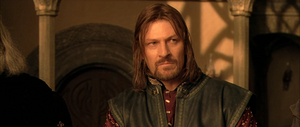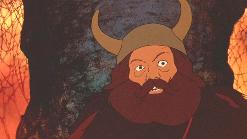Boromir facts for kids
Quick facts for kids Boromir |
|
|---|---|
| Tolkien character | |

|
|
| First appearance | The Lord of the Rings (1954) |
| Information | |
| Race | Man |
| Affiliation | Fellowship of the Ring |
| Title |
|
| Family |
|
| Home | Gondor |
Boromir is a fictional character in J. R. R. Tolkien's legendarium. He appears in the first two volumes of The Lord of the Rings (The Fellowship of the Ring and The Two Towers), and is mentioned in the last volume, The Return of the King. He was the heir of Denethor II (the 26th Ruling Steward of Gondor) and the elder brother of Faramir. In the course of the story Boromir joined the Fellowship of the Ring.
Boromir is portrayed as a noble character who believed passionately in the greatness of his kingdom and fought indomitably for it. His great stamina and physical strength, together with a forceful and commanding personality, made him a widely admired commander in Gondor's army and the favourite of his father Denethor. As a member of the Fellowship, his desperation to save his country ultimately drove him to betray his companions and attempt to seize the Ring, but he was redeemed by his repentance and brave last stand.
Commentators have remarked Boromir's vainglory and desire for the Ring. They have compared him both to other proud Tolkien characters such as Fëanor and Túrin Turambar, and to medieval heroes like Roland, who also blew a horn in battle and was killed in the wilderness. His boat-funeral, too, has been likened to Scyld Scefing's ship-burial in Beowulf.
Boromir appears in animated and live-action films of Lord of the Rings, and in radio and television versions.
Contents
Appearances
Boromir is the son of Denethor II and Lady Finduilas of Dol Amroth. He had a younger brother Faramir. A year after Faramir was born their father became the ruling Steward of Gondor, and Boromir became heir apparent, inheriting the Horn of Gondor. When Boromir's mother Finduilas died, he was only 10. Denethor always favoured Boromir over Faramir; he loved Boromir "too much, perhaps; the more so because they were unlike".
In response to prophetic dreams that came to Faramir and later to himself, Boromir claimed the quest of riding to Rivendell. His journey lasted a hundred and eleven days, and he travelled through "roads forgotten" to reach Rivendell, though, as he said, "few knew where it lay". Boromir lost his horse while crossing the Greyflood and travelled the rest of the way on foot.
The Fellowship of the Ring
In The Fellowship of the Ring, Boromir arrived at Rivendell just as the Council of Elrond was commencing. There he told of Gondor's attempts to keep the power of Mordor at bay. He attempted to persuade the Council to let him take the One Ring to defend Gondor, but was told that it would corrupt and destroy its user, and alert Sauron to its presence. He accepted this for the moment. He agreed to accompany Aragorn to Gondor's capital, Minas Tirith, and since their path lay with the Fellowship for the first part of the journey, he pledged to protect the Ring-bearer, Frodo.
Boromir accompanied the Fellowship south from Rivendell. Before departing, he sounded the Horn of Gondor, saying he "would not go forth like a thief into the night". On the journey south, he questioned the wisdom of their leader Gandalf. On the Fellowship's attempt to pass over the Misty Mountains, he advised that firewood be collected before the attempt to climb Caradhras, saving them from freezing in a blizzard. In the retreat from Caradhras, Boromir proved his strength as he and Aragorn forced a way through shoulder-high snowbanks back down the mountain.
The Fellowship then passed under the mountains through the caverns of Moria where Gandalf was killed, and Aragorn became their new guide. At the borders of the Elven realm of Lothlórien, Boromir was unnerved by the thought of entering, pleading with Aragorn to find another way "though it led through a hedge of swords"; he cited stories of elvish witchcraft, and the "strange paths" they had already taken which had caused Gandalf's death. Once in Lórien, Boromir was greatly disturbed by Galadriel's testing of his mind, telling Aragorn "not to be too sure of this lady and her purposes". On parting, Galadriel gave Boromir a golden belt and an Elven-cloak.
Boromir had always planned to go to Minas Tirith, and despite the consensus reached at Rivendell that the Ring must be destroyed in Mordor, he urged the Fellowship to accompany him to Minas Tirith before going on to Mordor. As Frodo pondered his course from Parth Galen, Boromir privately urged him to use the Ring in Gondor's defence, rather than to "throw it away". Finally, he succumbed to the temptation to take the Ring for himself, justifying this by his duty to his people and his belief in his own integrity.
True-hearted Men, they will not be corrupted. We of Minas Tirith have been staunch through long years of trial. We do not desire the power of wizard-lords, only strength to defend ourselves, strength in a just cause. And behold! In our need chance brings to light the Ring of Power. It is a gift, I say; a gift to the foes of Mordor. It is mad not to use it, to use the power of the Enemy against him. The fearless, the ruthless, these alone will achieve victory. What could not a warrior do in this hour, a great leader? What could not Aragorn do? Or if he refuses, why not Boromir? The Ring would give me power of Command. How I would drive the hosts of Mordor, and all men would flock to my banner!
After seeing that Frodo was unconvinced, Boromir half begged, half commanded him to at least lend the Ring, and when Frodo still refused, Boromir leaped to seize it. Frodo vanished by putting on the Ring and fled, intending to continue the quest alone. Boromir, realizing his betrayal, immediately repented of his actions and wept. Searching unsuccessfully for Frodo, he told the Fellowship of Frodo's disappearance, though not of his own misdeeds. The hobbits in a frenzy scattered to look for Frodo. Aragorn, suspecting Boromir's part in Frodo's flight, ordered him to follow and protect Merry and Pippin. The Fellowship was then attacked by a band of orcs.
The Two Towers
Fighting to defend Merry and Pippin, Boromir was mortally wounded by orc-arrows. In Pippin's words:
Then Boromir had come leaping through the trees. He had made them fight. He slew many of them and the rest fled. But they had not gone far on the way back when they were attacked again, by a hundred Orcs at least, some of them very large, and they shot a rain of arrows: always at Boromir. Boromir had blown his great horn till the woods rang, and at first the Orcs had been dismayed and had drawn back; but when no answer but the echoes came, they had attacked more fiercely than ever. Pippin did not remember much more. His last memory was of Boromir leaning against a tree, plucking out an arrow; then darkness fell suddenly.
Blasts from Boromir's horn alerted Aragorn, but he came too late to prevent the hobbits' capture. As Boromir lay dying, he remorsefully confessed to attempting to take the Ring from Frodo. He urged Aragorn to save Minas Tirith, as he himself has failed. Aragorn reassured him that he had not failed, that indeed "few have gained such a victory". Aragorn, Gimli, and Legolas placed Boromir's body in one of their Elven boats, with his sword, belt, cloak, broken horn, and the weapons of his slain foes about him. They set the boat adrift in the river toward the Falls of Rauros, singing the "Lament of the Winds" as his funeral song.
Three days later, Faramir, to his and their father's great grief, saw the boat bearing his dead brother floating down the River.
Names and titles
Boromir is the son and heir apparent of Denethor, the ruling Steward of Gondor. Appendix A calls him "Captain of the White Tower", while Faramir called him "High Warden of the White Tower" and "our Captain-General".
Boromir was described by Tolkien as a name "of mixed form"; it combines Sindarin bor(on)- 'steadfast' and Quenya míre 'jewel'. But the Stewards of Gondor also often bore names "remembered in the songs and histories of the First Age", regardless of meaning, and the name Boromir did appear during the First Age in The Silmarillion. The eleventh steward of Gondor, Denethor I, had as well a son called Boromir who was described as a great warrior. This might have been an inspiration for Denethor II to name his first son.
Portrayal in adaptations
In both Ralph Bakshi's 1978 animated film and in the subsequent BBC Radio serial, Boromir is played by Michael Graham Cox.
Boromir is played by Carl-Kristian Rundman in the 1993 Finnish miniseries Hobitit.
In Peter Jackson's The Lord of the Rings film trilogy, Boromir is played by Sean Bean. His line "One does not simply walk into Mordor" became famous enough for Bean to comment that the "one does not simply" meme (with variant endings) would "probably be my unintended legacy". In a departure from the structure of Tolkien's book, Boromir's death is shown at the end of The Fellowship of the Ring (2001), instead of being related at the beginning of The Two Towers.
In The Two Towers (2002), Boromir appears in the theatrical version only briefly during the beginning flashback sequence of Gandalf's fight with the Balrog in Moria. The Extended Edition adds two additional flashbacks: first when Faramir remembers finding Boromir's body and his cloven horn in the elven boat washed up on shore; and in longer flashback (the only scene of the film trilogy where Boromir and Faramir are seen speaking to each other), after Boromir's victory in Osgiliath and before his departure for Rivendell. The two brothers are seen celebrating and laughing before their father interrupts, asking him to go to Rivendell to seek the One Ring. Here Boromir apparently knows that "Isildur's Bane" is the One Ring, and he is chosen by his father, despite his reluctance to go, in response to a summons from Elrond.
In The Return of the King (2003), Boromir appears in the theatrical version during a brief flashback as Pippin remembers his heroic self-sacrifice. In the Extended Edition of the film, Boromir appears briefly when Denethor looks at Faramir and imagines for a moment that he sees Boromir walking towards him, smiling.
See also
 In Spanish: Boromir para niños
In Spanish: Boromir para niños


